新概念第一册第141课课件
合集下载
新概念第一册141-142
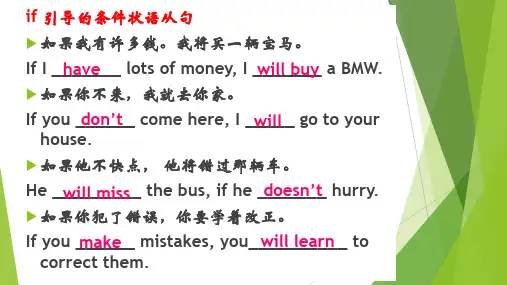
teach___________ give___________ take_____________ bring___________ get___________ buy_____________ fly __________ hurt__________ swim___________
Kart Benz
I decided to take her by train. Sally was very excited because she had never travelled on a train before. decide (v.) decide to do sth. decide not to do sth.
Sally’s first train ride
Last week, my four-year-old daughter, Sally, was invited to a children’s party. be (am, is, are, was, were) + v. pp.
I open the door. The door is opened by me. Is the door opened by you? Yes, it is. No, it isn’t. I opened the door. The door was opened by me.
9. Why did the lady make up her face? 30’
To make herself beautiful.
10. Did Sally think the lady was beautiful? 10’
No, she thought the lady was ugly.
Kart Benz
I decided to take her by train. Sally was very excited because she had never travelled on a train before. decide (v.) decide to do sth. decide not to do sth.
Sally’s first train ride
Last week, my four-year-old daughter, Sally, was invited to a children’s party. be (am, is, are, was, were) + v. pp.
I open the door. The door is opened by me. Is the door opened by you? Yes, it is. No, it isn’t. I opened the door. The door was opened by me.
9. Why did the lady make up her face? 30’
To make herself beautiful.
10. Did Sally think the lady was beautiful? 10’
No, she thought the lady was ugly.
新概念英语第一册141课
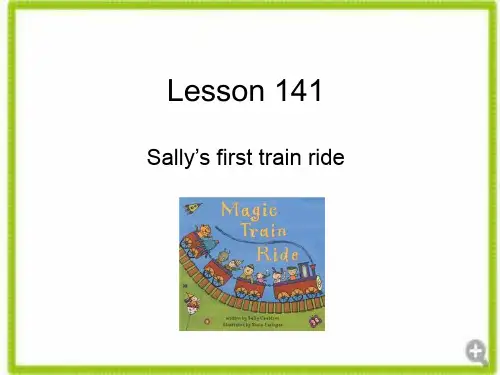
curiously adv.
好奇地
• “What are you thinking?” he asked curiously. • He asked me what I was thinking.
funny
adj.
可笑的,滑稽的
• I’ll tell you a funny story, if you keep quiet. • Is this new man funny, then? • “那么,新来的这个人滑稽吗?”
( ) 6 The sports meeting ___ be held until next week. A. didn't B. won't C. isn't D. doesn't ( ) 7___ the watch been repaired yet? I really need it. A. Does B. Has C. Is D. Are ( ) 8 Who was the book___? A. write B. wrote C. written D. written by ( ) 9 The books may___ for two weeks. A. be kept B. be borrowed C. keep D. borrow
powder compact
• powder compact
• 粉盒
amutory amuses me. 他的故事使我发笑。 2 He told amusing jokes after dinner. 他在饭后讲了几则令人捧腹的笑话。 3 We were greatly amused by __? A what you have told us B which you have told us C what you told us D that you told us (C )
新概念英语NCE1_lesson141-142(共19页)课件
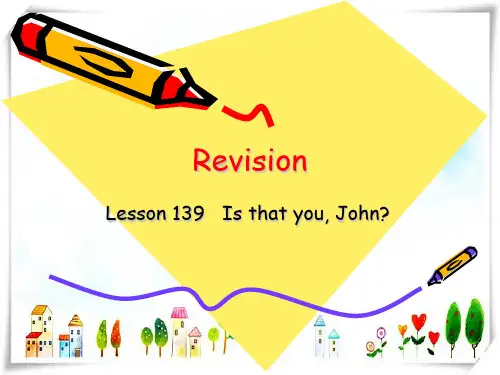
She opened her handbag and took out her powder compact.
5. Did Sally think the lady was beautiful? No, she thought that the lady was still ugly.
6. How did Sally’s mother feel? She felt embarrassed.
• 慈祥的笑着
smile kindly
• 对这个消息我们感到很激动。
We are excited at this news. • 看!那个女孩戴着一顶有趣的帽子。
Watch the video and answer these questions:
1. How old is Sally? She is four years old. four-year-old daughter 2. Why did Sally’s mother decide to take her by train?
• excited adj. 兴奋的 exciting adj. 令人兴奋的 be excited at … 对…感到激动
• interested interesting be interested in… 对…感兴趣
• surprised surprising be surprised at… 对…感到惊讶
• worry v. 担心 worried adj. 担心的 worrying adj. 令人担心的
Revision
Lesson 141 Sally’s first train ride
Translation
• 登上
get on
• 一位中年男人 a middle-aged man
5. Did Sally think the lady was beautiful? No, she thought that the lady was still ugly.
6. How did Sally’s mother feel? She felt embarrassed.
• 慈祥的笑着
smile kindly
• 对这个消息我们感到很激动。
We are excited at this news. • 看!那个女孩戴着一顶有趣的帽子。
Watch the video and answer these questions:
1. How old is Sally? She is four years old. four-year-old daughter 2. Why did Sally’s mother decide to take her by train?
• excited adj. 兴奋的 exciting adj. 令人兴奋的 be excited at … 对…感到激动
• interested interesting be interested in… 对…感兴趣
• surprised surprising be surprised at… 对…感到惊讶
• worry v. 担心 worried adj. 担心的 worrying adj. 令人担心的
Revision
Lesson 141 Sally’s first train ride
Translation
• 登上
get on
• 一位中年男人 a middle-aged man
新概念1lesson143-144x

汇报人:
课文练习
练习1:完成课文中的填空题巩固所学词汇和语法知识。 练习2:翻译课文中的句子提高语言表达能力。 练习3:根据课文内容回答问题加深对课文的理解。 练习4:完成课后习题全面巩固所学知识。
词汇拓展
掌握新概念1 lesson143144中的重点 词汇和短语
了解并掌握常 用的英语表达
方式
词汇解析
单击添加标题
词汇量:本课共有20个新单 词单击添加标题重点词汇:present, fmilir, yet, still
单击添加标题
词汇讲解:present-作动词 表示“赠送”作形容词表示 “ 在 场 的 ” ; f m i l i r- 形 容 词 表示“熟悉的”;yet-副词 表示“还仍然”;still-副
句子修饰:通过添加 修饰语使句子更加生 动形象例如使用形容 词、副词等。
从句使用:适当使用 从句使句子更加完整 和流畅例如使用定语 从句、状语从句等。
课文拓展
课文背景:了解作者生平及写作背景加深对课文的理解 相关话题:探讨与课文主题相关的其他话题拓展知识面 语法重点:分析课文中的语法重点和难点提高语言运用能力 写作技巧:学习课文中的写作技巧和表达方式提升写作水平
语法练习
练习形式:选择题、填空题、改错题等 练习内容:涵盖课文中出现的重要语法点 练习难度:根据学生的学习水平设置难度等级 练习目的:帮助学生巩固所学语法知识提高语言运用能力
句型练习
掌握课文中的重点句型 通过替换练习巩固句型运用 结合例句进行仿写练习提高语言表达能力 通过对话练习培养口语交际能力
通过阅读英文 文章和听力练 习提高词汇量 和语言表达能
力
掌握常用的英 语语法和句型
结构
语法拓展
新概念L141-142课件
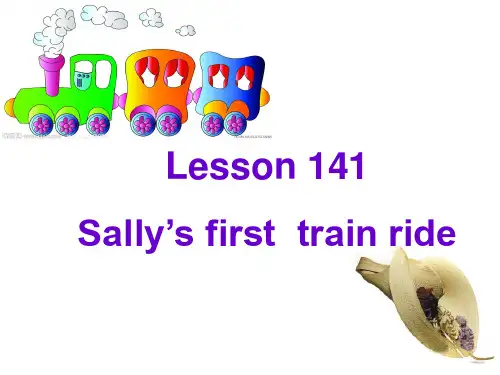
• • • • •
kindly adv. 和蔼地 他待我亲切。 He treated me kindly. 他好心开车送我回家 He kindly drove me home.
• • • • • • • • •
ugly adj. 1)丑陋的,难看的 现在他把一个丑陋的石雕头像挂在大门上。 Now he puts an ugly stone head over the gate. 2)不愉快的,讨厌的 amused adj. 有趣的,表示(人表情等)愉快 amusing adj. 好笑的,好玩的,有趣的 去年我有过一次好笑的经历。 I had an amusing experience last year.
Lesson 141 [ik'saitid] ['midl'eidʒd] ['ɔpəzit]
a.兴奋的 登上 a.中年的 prep.在…对
['kjuəriəsli] ad.好奇地 ['fʌni] a.可笑的,滑稽的 ['paudə] n.香粉 ['kɔmpæ kt] n.带镜的化妆盒 ['kaindli] ad.和蔼地 ['ʌgli] a.丑陋的 [ə'mju:zd] a.有趣的 [smail] v.微笑
• • • • •
• • • • • •
opposite 1)prep. 在…对面 那女服务员站在我对面 The waitress stood opposite me. 2)adj. (位置)对面的 (立场,性质等)相反 的,反对的 他站在那条街的对面 He stood on the opposite side of the street. 我们办公大楼在银行的对面 Our office building is opposite to the bank. 她的看法和我的看法完全相反 Her views and mine are completely opposite.
新概念英语第一册lesson141-142
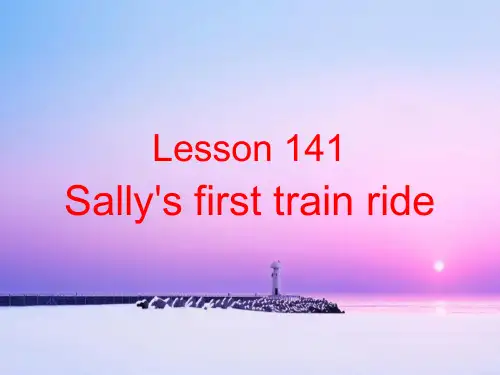
PassGivreamVomicaer 被动语态
English spoken
English is spoken by the most people in the world.
built
The Great Wall was built by Chinese people.
What is it?
学生们拿出课本,开始阅读。 The students took out their textbooks and started reading.
She then began to make up her face. make up 化妆,打扮
我们赶到的时候,演员们还在化妆。 The actors were making up when we arrived.
I decided to take her by train. decide to do sth 决定去做某事 我决定开始学习法语。
I’ve decided to learn French. Sally was very excited because she had never
traveled on a train before. because 连词,引导原因状语从句
Last week, my four-year-old daughter, Sally, was invited to a children's party. I decided to take her by train. Sally was very excited because she had never travelled on a train before. She sat near the window and asked questions about everything she saw. Suddenly, a middle-age lady got on the train and sat opposite Sally. 'Hello, little girl,' she said. Sally did not answer, but looked at her curiously.
新概念英语第一册143-144课课件
requirements • Summary and Review
01 Course Introduction
Course objectives
• Language knowledge:To help students master basic English vocabulary and grammar, including words and expressions related to daily life, school life, and other common social scenarios.
03 Practice and consolidation
Vocabulary exercises
01
Word Formation
Teach students how to form words by adding suffixes or
prefixes to root words, such as "un-" or "-able".
Lesson 144:Continuation of Lesson 143, focusing on more advanced vocabulary and grammar related to the topic. Students will practice their listening, speaking, reading, and writing skills through various activities and exercises. They will also learn more about Western culture and ways of life through reading and discussion.
01 Course Introduction
Course objectives
• Language knowledge:To help students master basic English vocabulary and grammar, including words and expressions related to daily life, school life, and other common social scenarios.
03 Practice and consolidation
Vocabulary exercises
01
Word Formation
Teach students how to form words by adding suffixes or
prefixes to root words, such as "un-" or "-able".
Lesson 144:Continuation of Lesson 143, focusing on more advanced vocabulary and grammar related to the topic. Students will practice their listening, speaking, reading, and writing skills through various activities and exercises. They will also learn more about Western culture and ways of life through reading and discussion.
新概念一 Lesson 141 143
★place v. 放
• • • • • • • • • ① v.(小心地)放;放置 He placed the record back to the shelf. 他把唱片放 回到架子上。 Their request placed me in a difficult position. 他们的要求将我置于困境。 ② v. 任命;安置 The company has placed him with a branch office in Tokyo. 公司任命他在东京的一家分支机构工作。 There is no better way to place the homeless children. 没有更好的办法来安置这些无家可归的孩子们。
•
• • •
被动语态
• 英语动词有主动语态和被动语态之分。 在主动句中,动词的主语是执行动作的人 或物。在被动句中,主语是动作的承受者。 • 英语中表达感情的动词通常可用于被 动式,这些动词如amuse,embarrass, worry,surprise,interest,upset等。
• •
被动语态的构成:be+过去分词 过去分词不一定指过去,时态与be动 词有关:
Lesson 141 Sally's first train ride
★curiously adv.好奇地
• • ① adv. 好奇地 The little boy watched curiously as his mum opened the box. • ② adv. 过于好奇地 • She curiously opened the letter addressed to her husband. • 她抑制不住好奇心,拆开了别人写给 她丈夫的信。
2018 新概念英语第一册 lesson141 Sally's first train ride
Translation
• 他昨晚聚会迟到了。 He was late for the party yesterday evening. • 我恐怕我不明白。 I’m afraid I don’t understand. • 我的数学老师想让我做写额外的作业。 My Maths teacher wants me to do some extra homework. • 顺便问一下,你需要帮助吗? By the way, do you need any help? • 你在哪家公司上班? Which company do you work for?
She opened her handbag and took out her powder compact.
5. Did Sally think the lady was beautiful? No, she thought that the lady was still ugly. 6. How did Sally’s mother feel? She fel
litter basket
废物筐
Listen to the story and see if you can answer this
question:
Why was the mother embarrassed?
Answer: Because Sally told the middle-aged lady
Everyday English
2018/3/12
Brain storm!
• There is no royal road to learning. 书山有路勤为径,学海无涯苦作舟。 • The frog in the well knows nothing of the great ocean. 坐进观天。 • The finest diamond must be cut. 玉不琢,不成器。 • A young idler, an old beggar. 少壮不努力,老大徒伤悲。 • Success belongs to the persevering. 坚持就是胜利。 • Pride goes before, and shame comes after. 骄傲使人落后。
新概念英语第一册第141课
文
• The lady was dressed in a blue coat and a large, funny hat. • After the train had left the station, the lady opened her handbag and took out her powder compact. • She then began to make up her face. • ‘Why are you doing that?’ Sally asked. • ‘To make myself beautiful,’ the lady answered. • She put away her compact and smiled kindly. • ‘But you are still ugly,’ Sally said. • Sally was amused, but I was very embarrassed!
•
They will set up a new school next year.
• • • • • • • • • • • • • • • •
一般将来时:主+will+动词原形 主+will+be+动词的过去分词 The house is being built by them. They will set up a new school next year. A new school will be set up (by them ) next year. 过去进行时:主+was/were+doing 主+was/were+being+动词的过去分词 They were building the house at this time last year. The house was being built by them at this time last year. 过去完成时: They had finished the project by the end of last year. They project had been finished by the end of last year. 情态动词:情态动词+动词原形 情态动词+be+动词的过去式 You must finish the work before five o’clock. The work must be finished before five o’clock.
